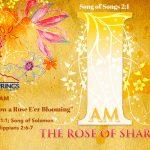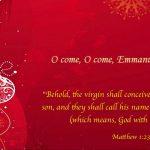“O Come, O Come, Emmanuel”
December 3, 2017 • KSYC • Download this broadcast (PDF)
 Today is the first Sunday of the Advent and Christmas season. This season, the month of December, I will preach on the great songs of Christmas, and how they refer to the Bible. I will begin with “O Come, O Come, Emmanuel,” a 13th century Latin hymn.
Today is the first Sunday of the Advent and Christmas season. This season, the month of December, I will preach on the great songs of Christmas, and how they refer to the Bible. I will begin with “O Come, O Come, Emmanuel,” a 13th century Latin hymn.
“O Come, O Come, Emmanuel” is too Scripturally-rich to not be one of the favorite Advent hymns of Christian churches. It addresses the majestic titles of Christ used throughout Scriptures. And although the tune is a somber chant, a refrain that bursts into a joyful “Rejoice!” was added later.
This Advent hymn may have been used by 5th century Jewish Christians, since most of the themes are from the Old Testament. In the 9th century, the hymn was incorporated by the medieval church for use during Advent. During the week before Christmas Day, seven “Great ‘O’ Antiphons,” each of them in praise and wonderment (“O”) of an Old Testament name for the coming Messiah, were chanted. Psalm 136 is an example of these antiphonal chants. A leader chants, “Give thanks to the Lord, for he is good,” and the congregations chants in response, “For his steadfast love endures forever.” In 26 verses, the worship leader chants the different ways in which God has shown his steadfast love.
In the 13th century, these “Great ‘O’ Antiphons” antiphons were put in Latin hymn form, “Veni, Emmanuel,” and the “Rejoice” refrain was added. In Latin, the seven antiphons formed an acrostic from the opening words:
“O Sapienta” (Wisdom): In Christ are found “all the treasures of wisdom and knowledge” (Cl 2:3).
“O Adonai” (Lord of Might): He is called “Mighty God” (Is 9:6).
“O Radix Jesse” (Root of Jesse): After the kingdom of Jesse’s son David was cut down to a mere stump, Messiah will come and rebuild it into a kingdom of all nations (Is 11:1, 10).
“O Clavis David” (Key of David): The Son of David will have the authority to open and shut heaven’s gate (Is 22:22).
“O Oriens” (Light of the East): As the bright Morning Star and Dayspring, the Messiah will give light to all who walk in darkness (Nm 24:17; Is 9:2; John 8:12).
“O Rex gentium” (King of Nations): At last, when he returns, he will reign as King of Kings, and Lord of Lords (Is 9:6; Rv 19:16).
“O Emmanuel” (God With Us): He came down from heaven to dwell with us (Jn 1:14). And he will return to take us to his dwelling-place forever (Rv 21:3).
But the use of the hymn did not become widespread until Thomas Helmore (1811-90), and John M. Neale (1818-66), both Anglican priests and musicians, published an English translation with a four-part harmonization in 1854. Almost every single line of this hymn is rich in Scripture references.
Let’s listen first:
O come, O come, Immanuel,
and ransom captive Israel
that mourns in lonely exile here
until the Son of God appear.
Immanuel is the name given to Jesus in the prophecy in Isaiah 7:14, so in Matthew 1:23, the angel said Jesus will be called “Immanuel,” which means “God with us.” “And ransom captive Israel” comes from Isaiah 35:10, so 1 Peter 1:18-19 says that believers in Christ are ransomed from “futile ways” with his precious blood. “That mourns in lonely exile here” refers to Israel’s exile in Babylon in Isaiah 66:10. And when “the Son of God appeared,” he brought salvation to God’s people, referring to Titus 2:11-13.
O come, O Wisdom from on high,
who ordered all things mightily;
to us the path of knowledge show
and teach us in its ways to go.
This verse refers to the prophecy in Isaiah 11:2, “And the Spirit of the LORD shall rest upon him, the Spirit of wisdom and understanding . . . counsel and might . . . knowledge and the fear of the LORD.” Jesus declared himself as the fulfillment of this prophecy when he read this passage in a synagogue, and said in Luke 4:21, “Today this Scripture has been fulfilled in your hearing.” The apostle Paul also refers to this prophecy when he says in 1 Corinthians 1:24 and 30, “Christ the power of God and the wisdom of God . . . who became to us wisdom from God.”
O come, O come, great Lord of might,
who to your tribes on Sinai’s height
in ancient times did give the law
in cloud and majesty and awe.
Stanza 3 refers to God’s covenant with Israel at Mount Sinai, after they escaped from slavery in Egypt. There, God gave his chosen nation Israel his moral, ceremonial and civil laws. “Lord of might” is from Deuteronomy 10:17, where Moses writes, “For the LORD your God is God of gods and Lord of lords, the great, the mighty, and the awesome God.” And in Exodus 19:16-20, Moses writes that when God gave the law to Israel at Mount Sinai, he appeared before them “in thunders and lightnings and a thick cloud on the mountain and a very loud trumpet blast . . . like the smoke of a kiln, and the whole mountain trembled greatly.”
O come, O Branch of Jesse’s stem,
unto your own and rescue them!
From depths of hell your people save,
and give them victory o’er the grave.
In Isaiah 11:1 and 10, the Branch of Jesse refers to the prophesied Messiah who was to come. Jesus says in Matthew 16:12 that he will build his church, and this church will overcome the gates of hell. So Paul also says in Romans 15:12 that in Christ, “the root of Jesse . . . will the Gentiles hope.” What is this hope? It is the hope of eternal life, life without death, as when Paul says in 1 Corinthians 15:54-55, “Death is swallowed up in victory. O death, where is your victory?” This victory over death was fulfilled by Christ when he arose from the grave.
O come, O Key of David, come
and open wide our heavenly home.
Make safe for us the heavenward road
and bar the way to death’s abode.
The “key of David” comes from Isaiah 22:22, “And I will place on his shoulder the key of the house of David. He shall open, and none shall shut; and he shall shut, and none shall open.” The apostle John quotes this verse in Revelation 3:7, where he says that Jesus “has the key of David, who opens and no one will shut, who shuts and no one opens.” Christ is the one who has the key to the kingdom of heaven, the Christian’s final dwelling-place which Jesus is even now preparing for him (John 14:6). Not only does Jesus hold the key to heaven; he also holds the key to Death and Hell (Rev 1:18).
O come, O Bright and Morning Star,
and bring us comfort from afar!
Dispel the shadows of the night
and turn our darkness into light.
Jesus said in John 8:12, “I am the Light of the world” (John 8:12), and the rest of the Bible refers to him in similar light. He is prophesied as the Star of Jacob in Numbers 24:17; “a light for the nations” in Isaiah 42:6, 49:6 and 60:3; “Sun of righteousness” in Malachi 4:2; “the true light” in John 1:9; the “bright morning Star” in Revelation 22:16. His star in Bethlehem marked the house where he was born. Jesus the Light will give comfort to his people in Isaiah 40:1. He will give light to his people walking in darkness in Isaiah 9:2 and 1 Peter 2:9. Mary praises God because her Child will “give light to those who sit in darkness and in the shadow of death, to guide our feet into the way of peace” in Luke 1:79.
O come, Desire of the nations,
bind in one the hearts of all mankind.
Bid all our sad divisions cease
and be yourself our King of Peace.
This stanza refers to Jesus’ prayer in the Garden of Gethsemane that his followers “may all be one.” The apostle John sees a heavenly vision Revelation 15:4 where “all nations will come and worship” God and Christ. Isaiah 9:6-7 prophesies that the Child born will be the “Prince of Peace” who will bring justice and righteousness to the world. So the angels sang in Luke 2:14, “on earth peace among those with whom he is pleased!” And Paul says in Romans 5:1 that Christians “have peace with God” through Christ.
Finally, the beautiful Refrain, “Rejoice! Rejoice! Immanuel shall come to you, O Israel,” echoes two other Isaiah prophecies. Isaiah 59:20 says “a Redeemer will come to Zion.” And in Isaiah 66:10, the prophet calls God’s people: “Rejoice with Jerusalem, and be glad for her, all you who love her; rejoice with her in joy all you who mourn over her to those in Jacob who turn from transgression.” Jesus came to turn our mourning over sin into dancing over righteousness.
So, Christians, rejoice! Not only every Christmas season, but every moment of your life, because your Immanuel and Redeemer has come.



